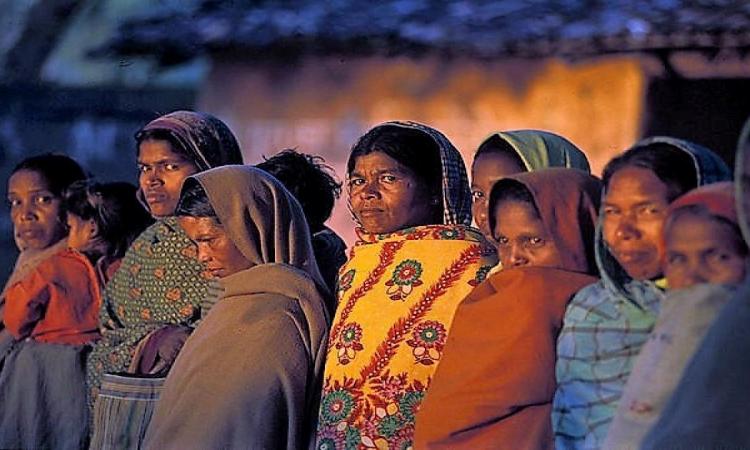
Poor access to water and sanitation can not only affect physical, but also the emotional or psychological well being of women negatively and can hinder the ability of women to participate more widely in education and employment. There are very few studies that look at how women’s inability to meet their menstrual needs due to poor access to water and sanitation can impact their social and psychological well-being.
This study titled 'Managing menstruation with dignity: Worries, stress and mental health in two water-scarce urban communities in India' published in Global Public Health interviewed married women living in highly water insecure neighborhoods in New Delhi, namely Taimoor Nagar and Batla House. Women in these neighbourhoods had to navigate both - a lack of basic sanitation facilities and stringent social norms and rules regarding menstrual hygiene. The study aimed at understanding the varied emotional, psychological, cultural and physical impacts of these restricted circumstances on the women's lives.
The study found that:
- Women had specific ideas about what constituted ‘responsible’ and ideal conduct with respect to menstruation management and associated cleanliness and hygiene concerns.
Women expressed the importance of physical health and cleanliness such as relieving themselves of toxins during menstruation. Women not only focused on cleaning their bodies, but also on the proper disposal of menstruation-related waste with discretion. An underlying concern for women appeared to be their need to ensure that others, especially men, should not know they were menstruating. Many women felt that ‘bad’ practices around menstruation management included the use of soiled cloth instead of disposable pads or clean cloths, lack of frequent bathing, and lack of discretion in managing menstrual blood and soiled products.
- Taboos associated with menstruation further increased their anxiety in the absence of water:
A common concern was on preventing others, especially men and also family members in some cases from being made aware of menstruation. Stains and the pollution had to be avoided during menstruation and also behaviours such as touching anything considered holy in the house or the community.
- Water was the most important need highlighted by women that affected their dignity and ideas of personal hygiene and cleanliness.
Water and sanitary pads were the two most important items women said they needed for managing their menstruation in a dignified way. Other necessities commonly mentioned included laundry and hand soap, private toilets, and appropriate undergarments.
- Women had to adopt multiple strategies to cope with lack of water
These included actions such as skipping bathing or partial cleaning, storing more water that they had to bring themselves, more allocation for self at the cost of other family members within the household, avoiding household tasks such as mopping or washing dishes in order to have enough water to keep clean during menstruation, drawing water from different sources, purchasing water from other sources or borrowing water from friend’s taps or neighbor’s water containers.
- The persistent lack of water led to an array of negative emotions among the women.
Humiliation, shame, and worry about a perceived loss of dignity (or the possibility of a future loss of dignity) were concerns raised by all women. This was because of the inability to maintain personal hygiene and manage menstruation inefficiently due to lack of water or not being able to do all the daily chores because of the need to reallocate water for menstrual hygiene.
The constant worry and humiliation of being unable to wash menstrual clothes due to lack of water, fear of staining clothes, not being able to complete all household tasks and the need to divert water away from other household usage for menstrual needs were important concerns raised by women. Personal hygiene versus house hygiene was a delicate balancing act for many women since cleanliness of both kinds was considered essential for a 'dignified and responsible woman'.
While menstruation itself was experienced as a time of elevated frustration, anger, and other negative emotions, when water scarcity and menstruation combined, the effects on women were even more severe. Women said that they could not comfortably interact with anyone and anger and frustration was very high.
Access to water, crucial for physical - and mental health of women
A growing body of evidence now shows that access to adequate water is not only important for physical health, but also for women’s mental health. Lack of water during menstruation can be especially emotionally challenging because it violates women’s basic sense of self, especially their dignity. Furthermore, this connection is mediated by women’s perceived failures in menstrual management in the context of rigid and gendered notions of responsibility and dignity around cleanliness.
Women are constantly conscious of a set of socially acceptable norms around dignified behaviour and cleanliness with respect to menstrual management which are often communicated through what is already being practiced by other menstruating females, mostly in families or in schools.
Public health norms around hygiene and ‘cleanliness’ intersect and overlap with sociocultural and religious norms around ‘pollution’, ‘dirt’ or ‘unholiness’ producing powerful messages that are frequently reinforced and women find it extremely difficult to follow these norms in their everyday lives where lack of access to water is a burning concern.
Moreover, most of the dictates around hygiene and purity expect women not only to clean themselves and their own bodies but also remain conscious of that of their families as well as the surroundings. Public health dictates and teaching around hygiene tends to amplify the distress of women in not being able to meet these norms, in the absence of water.
The study findings thus underscore the important role of water in menstrual management – an important public health issue. Research and policy interventions aiming to address women’s menstruation challenges should broaden the definition of period poverty to accommodate the role of water as a key resource, argues the article.
The paper can be accessed here
/articles/water-scarcity-and-psychological-distress-among-women